How To Draw Softball In Cursive
Examples of Handwriting Styles
A handwriting fashion is a carefully designed, efficient style of forming letters and numbers. Each style has its own character or fits a certain need. The near common styles are shown here.
Most of these examples were created
with Startwrite Handwriting Software.

New American Cursive, handwriting style
New American Cursive
I like New American Cursive. This course of cursive is elementary and clean. The child learns to write using cursive—they offset with cursive. There is no manuscript form, although, the capital letters F, Q, T, and Z are fabricated similar manuscript capital letters. Another option would be to start a child with Zaner-Bloser Continuous Stroke Cursive.
Cursive — New American Cursive

Handwriting Without Tears, Printing - Handwriting Style
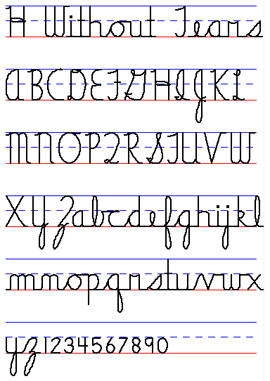
Handwriting Without Tears, Cursive - Handwriting Style
Handwriting Without Tears
Handwriting Without Tears is a simplified fashion, without a slant, and has a rather blocky experience to it. Adult by an occupational therapist, the program includes many tactile products for writing readiness and an app for memorizing letter course. It is pop in the U.s.a., but I notice it also simple. It is not beautiful and the cursive doesn't flow.
Printing - Handwriting Without Tears
Cursive - Handwriting Without Tears
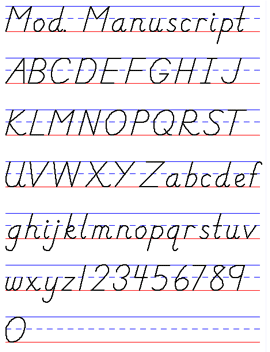
Modern Manuscript (D'Nealian) - Handwriting Fashion

Modern Cursive (D'Nealian) - Handwriting Style
Mod Manuscript and Cursive (D'Nealian)
Modern Manuscript (D'Nealian) starts with slanted manuscript letters with the intent to transition easily to cursive writing. As in cursive writing, the lower example manuscript messages are fabricated with one continuous stroke and most take "tails" (see the alphabetic character "a".) Modern Manuscript gained popularity in school districts in the United States in the late 1980's. Some notice it challenging to teach (the program includes auditory instructions) and dislike the manuscript "b" and "yard." I like it, just tend to teach it with modifications.
D'Nealian - manuscript and cursive chart
D'Nealian - manuscript only
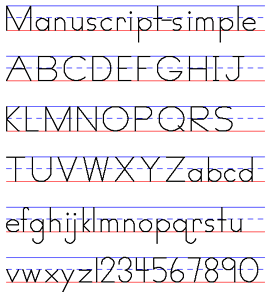
Elementary Zaner-Bloser Manuscript - Handwriting Fashion
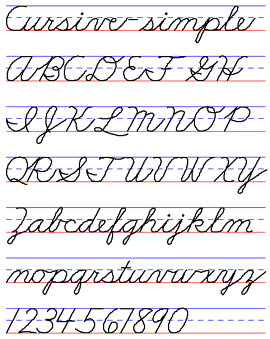
Uncomplicated Zaner-Bloser Cursive - Handwriting Style
Zaner-Bloser Continuous Stroke (Elementary)
This style is neither too challenging or too uncomplicated. Zaner-Bloser was the dominant handwriting fashion in the United states until Mod Manuscript (D'Nealian) gained popularity and this "continuous stroke" or "simplified" Zaner-Bloser was introduced. The continuous stroke applies to the manuscript messages—the pencil is non lifted to course a letter of the alphabet, as with the original Zaner-Bloser fashion. The cursive was simplified and most notable, the letter "Q" was changed to expect like a letter "Q" instead of an odd number "2." Continuous Stroke makes sense—it is the closest affair to how Marie taught manuscript alphabetic character formation. When she taught cursive to kickoff-graders, she used A Beka — that'southward what the individual school chose.
manuscript - uppercase & lowercase
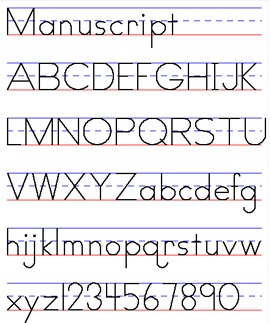
Zaner-Bloser Manuscript, Handwriting Mode,

Zaner-Bloser Cursive, Handwriting Style

Palmer Manuscript, Handwriting Style

Palmer Cursive, Handwriting Way
Peterson Handwriting
Peterson includes a transition between printing and cursive—it'southward chosen Slant Print. I don't have a sample to show here, but did include links to the site. Peterson's theme is "the difference is rhythm." The cursive messages stop without a curve, much like the Italic styles. This plan includes a depth of information, prompts and assistance. It seems like a lot of work, to me.
Impress
Slant Print
Cursive
Italic Handwriting Styles

Handwriting Fashion, Italic

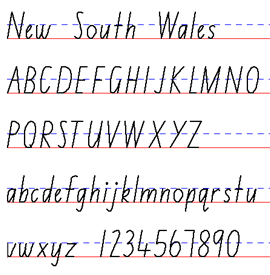
Handwriting Fashion, New Southward Wales


Handwriting Way, Queensland
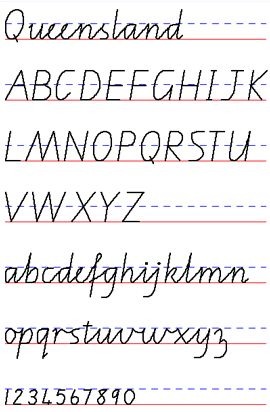
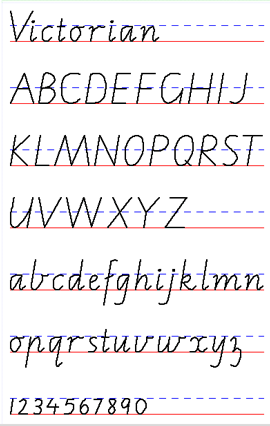
Handwriting Way, Victorian


Make handwriting practice fun. Startwrite Handwriting Software loads nearly of the popular handwriting styles on your computer, and so you can create custom practise sheets.
Source: https://www.drawyourworld.com/blog/examples-of-handwriting-styles.html
Posted by: grissomfrinslazince.blogspot.com


0 Response to "How To Draw Softball In Cursive"
Post a Comment